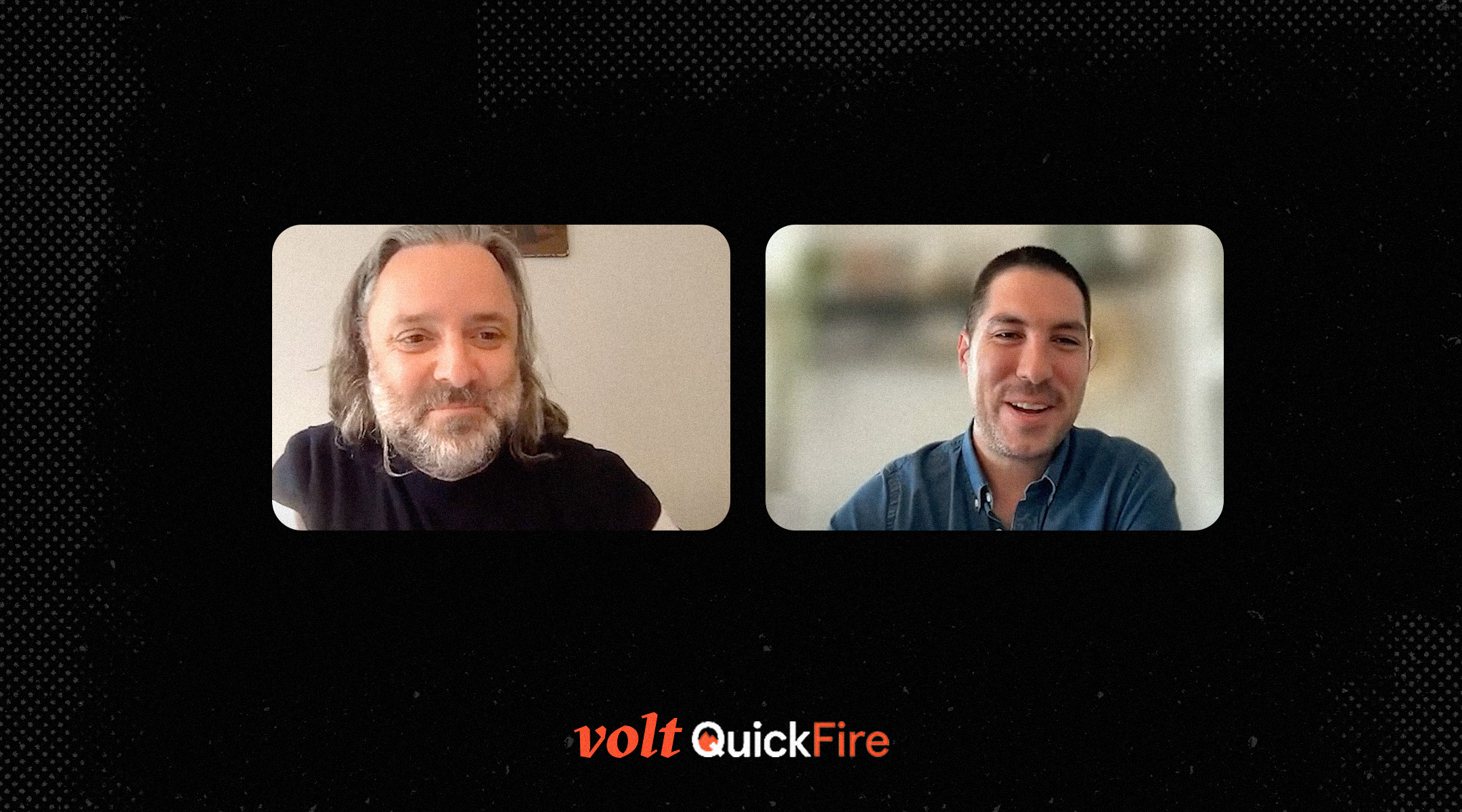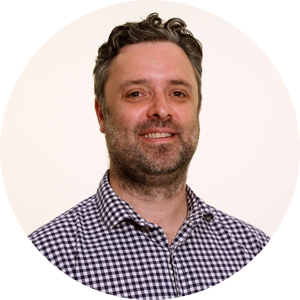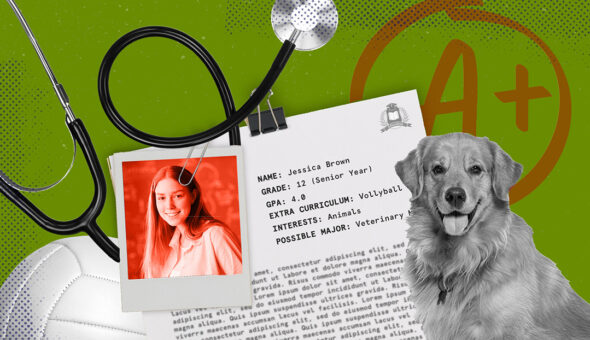Not everyone gets the chance to innovate in an industry that really needs it. And higher ed definitely needs it. “As a marketer, that’s about as exciting as it can get,” says David Miller, the executive director of content strategy and brand voice at the University of Arizona. “Where else do you get an opportunity to break fresh ground?”
In the latest Volt QuickFire, he explains the power of networking, what’s in his martech stack, what it takes to make students feel excited about higher education — and much more.
Read the full transcript here:
Kevin Renton:
Hi there, and welcome to QuickFire from Volt. This is where we put higher education marketers on the hot seat and subject them to 20 rapid questions with the goal of understanding what makes them tick, what makes them successful and what are their goals for the future?
Kevin Renton:
So in the crossfire today we’ve got David Miller, the Executive Director of Content Strategy and Brand Voice at the University of Arizona. So welcome, David.
David Miller:
Great to be here. Thanks for having me.
Kevin Renton:
First question. Everyone says it’s great to be here. Weekly questions.
David Miller:
Good to be here virtually with you.
Kevin Renton:
So first question, give us your elevator pitch. Who are you? What do you do at the University of Arizona? What’s your title, et cetera.
David Miller:
It’s always changing. That’s a good thing about what I do, but I am the Executive Director of Content Strategy and Brand Voice at the University of Arizona. And so what that means, right now, is I work with a really talented team of individuals who are devoted and a little bit obsessed with creating a seamless student experience from the time that students are in our prospect pipeline up and through their transition to college, and then ultimately towards graduation.
David Miller:
So we support a lot of enrollment efforts, a lot of retention efforts. Our job is to make sure that students have a really fulfilling experience and that we’re aligning them and their needs with the resources of a massive university. So really blessed, my boss Christie Harper and our SVP Steve Moore are awesome. They’re great champions for how we reach our students.
David Miller:
And we’re about a year into this venture of our team, which is called Campus Brand Engagement. And we’re fully responsible for marketing to our on campus student population in addition to bringing them in through the prospect funnel. So it’s a really exciting time.
Kevin Renton:
Okay. I wanted to work in higher education because…
David Miller:
It’s the chance to innovate in an industry that really needs it. And so that’s, as a marketer is about as exciting as it can get. Where else do you get an opportunity to break fresh ground? And so I think that is the thing that sort of keeps me energized every day, gets us up and going in the mornings.
Kevin Renton:
The marketing tool I can’t live without is?
David Miller:
I’m going to say it’s a marketing tool. In my world, it’s definitely a marketing tool, but I’m going to say Twitter. I’m pretty much addicted. Always, always scanning that unfortunately, but it’s a great place to get a pulse on what’s going on. And I always enjoy the memes too.
Kevin Renton:
What is your martech stack at the moment? Like what kind of tools do you use, or do you use for the content?
David Miller:
We’re a Slate university. So we’re using Slate constantly for all of our email communications in the enrollment side of things, but then for our students that are on campus, we’re using Salesforce Marketing Cloud. And so that’s a big one for us. We are currently using them for social media as well their social studio, but we know that’s going away so we’re going to be looking at some other enterprise tools for social. But gosh, then you name it, we’re a Drupal web campus. So always in there, always making updates on that. I mean, and then there’s just thousands of Google Docs that always need to be tracked down. And then Workfront though, Workfront is sort of the workhorse behind all of our project management. So we’ve really invested in that over the last, I don’t know 18 months, 2 years to get that up and running, that’s a beast, but it really keeps us on track. We find it’s really worth it. The more you put into a tool like Workfront the more you get out.
Kevin Renton:
In the next five years, I’d like to…
David Miller:
I think, keep delivering on the promise that the University of Arizona makes to its students every day. So we want to make students feel excited about continuing their lives with us. We’re going to help you maximize your potential and change the world. And so anyway that we can keep doing that, I think is a good way.
Kevin Renton:
My biggest professional mistake was…
David Miller:
Biggest professional mistake was, I think, early in my career, probably underestimating the importance of relationship building, especially with the folks that are within you within those four walls of the university campus. So I learned probably a little later than most, I’m not the sharpest guy, but it’s not just the work that you’re doing that comes across your desk. But it’s, this is something that my boss always talks about, we have influence, but we don’t have authority. So how are we working with people to create scenarios that are win-wins for both of us? How are we helping them to accomplish their big picture goals? So it’s a lot of that stuff that happens when you’re not at your desk that’s really important.
Kevin Renton:
When I’m not working, I’m…
David Miller:
When I’m not working, I am playing golf, working in my yard, hanging out with my wife, wrangling my dog and my cat. Any of the above, and not necessarily in that order.
Kevin Renton:
What’s your handicap, or do you…
David Miller:
I’m a pandemic golfer. So I have to say it’s a good day for me when I break 100. But it’s been a recent development, but I love it. I’ve got the bug really quickly once I started playing with some friends and so kept it up. I mean, talk about a character building sport, just you are constantly face-to-face with your own mistakes and dealing with life as it comes at you. So I got to say the lessons that are contained in that game it’s really, I mean in a weird way, help me grow and help me learn a lot. So the mental part of it I love, and then you’re just outside listening to music and hanging out with friends. So what’s better than that?
Kevin Renton:
You know, I always think once you get sum 100, before that, when you’re kind, as long as I don’t lose more than 10 balls.
David Miller:
Absolutely. [crosstalk 00:06:22] Absolutely. I finally had my first round where I could say I only lost one ball on the round that day. That was a, I walked home, I was 10 feet high. It was great.
Kevin Renton:
I start my day at…
David Miller:
I start my day whenever my dog and my cats say, so they’re, they’re again they’re pandemic pets, and they’re amazing. And I love them. They are, but they’re the ones who determine they set the alarm clocks in the house.
Kevin Renton:
The secret to our students succeeding at my school is…
David Miller:
I’ve heard this story a lot, but it’s really true. And it’s just, it’s sticking with it for our students. You know, it’s a big institution and there are so many new things that are getting thrown at you. And so sticking with it and unabashedly taking advantage of the incredible resources that are available to them and just trying new things and putting yourself out there. You know, we talk to students a lot and one of the major, major recurring themes and stories that we always hear is I put myself out there. I was a little intimidated at first, but then I took a chance on something new. I made some friends, I built a community and then I had an incredible four years. And so it’s so true it really does come out to, down to our us, making ourselves available as an institution and resources, but students, I cannot encourage them enough just to take a chance on yourself and stick yourself out there. And you’re going to have a good time, you’re going to have a great experience.
Kevin Renton:
I admire the marketing at…
David Miller:
There was a few, this is a hard question, but the one I kept coming back to, I admire the marketing at the New York Times. I find it just incredible how they have evolved as a, just as an institution into something that’s so far beyond a newspaper right now, just them as a, I would call it a content hub, but that’s, that’s doing it a disservice. It just, the way that it has evolved and morphed into what it’s become now is really, really cool to see and really incredible.
Kevin Renton:
Yeah, I agree with you. I think the way that New York Times is creating the different mediums that it’s publishing.
David Miller:
Oh my gosh, it’s incredible. The mediums that they’re involved in, I mean the talent that they have there, they’re making documentary films and long form podcast. I mean, it’s incredible what they do now.
Kevin Renton:
And I think, and here’s the thing like hats off them to, they’ve made some mistakes on that journey and there’s been some mistakes with journalism, but they’re, they’re pushing the edge of what a newspaper is and it’s-
David Miller:
Yes. Yeah. It’s really amazing to watch that happen and to watch it unfold. And I think the last thing they did, they purchased The Athletic and it’s like, are they going to make a move into sports verticals now? It’s just really fascinating to watch that, what’s their next step going to be? It’s pretty cool.
Kevin Renton:
Biggest challenge facing higher education marketers is…
David Miller:
The biggest challenge for higher education marketers, it’s just going to be continuing to deliver results for those who might underestimate or might not have a great understanding of the value of marketing. And so it’s just continuing to deliver that service, continuing to improve the student experience and letting the results, sort of speak for themselves.
Kevin Renton:
Next question was my favorite social media channel is? We know it’s Twitter.
David Miller:
It’s Twitter, absolutely. It’s the best.
Kevin Renton:
What’s your second?
David Miller:
Second. You know, it’s Twitter or Instagram.
Kevin Renton:
Okay.
David Miller:
By far, by far those two, I think we all are, but I’m especially, I’m pretty addicted to my phone. And so if I’m not checking email or doing something that work related on there, I’m looking at Twitter or Instagram, unfortunately, but really it is the best place to consume what’s happening in real time for better or worse. And that’s where it becomes, that’s where it’s value really shows. But that’s also the scary side of it.
Kevin Renton:
My biggest professional achievement is…
David Miller:
Hopefully it hasn’t happened yet. I just crossed the 10 year mark with my institution. That’s a little mind blowing. And I think we just want to keep innovating as a team. We want to keep figuring out where we need to be for our students and how to best deliver on that and make them have a good experience. So anything we can do to keep doing that, I will count as a biggest professional achievement.
Kevin Renton:
What’s working in higher ed right now?
David Miller:
What is working in higher ed is the people, everybody is working really, really hard right now. There’s been a lot of think pieces about whether higher education staffers and administrators and faculty are reaching some kind of breaking point. We are not immune to what’s going on with the great resignation. So it’s really interesting to see right now. I think we’re at an inflection point as an industry about how we’re going to take care of the people that make universities run. So yeah, I would say anything we can do to care of people is fantastic. But yeah, people are what’s working in higher ed right now.
Kevin Renton:
The opposite. What’s not working in higher ed right now, right now?
David Miller:
I think just like society, trust, there’s a lot of mistrust out there. There’s a lot of jaundice views of what higher education can and should do. And that’s coming from inside the institutional walls and from outside the institutional walls. So it’s really more important than ever that higher education institutions really need to work on creating internal cultures. And that’s a place where you see that happen in the corporate world a lot where culture is a big, big thing. I continue to think that needs to be something that higher education institutions focus on and grow more of. So I would hope that can lead to more trust in our institutions.
Kevin Renton:
The future of higher education will be…
David Miller:
Full of change, full of change. And especially in the near future and the near next five years, I think we’re going to continue to have students migrating to online spaces, of course, and different modes of delivery hybrid is going to continue to emerge. And then we’ve got the demographic cliff, which we’ve been talking about for years, but it’s finally looming. And so I think that’s going to hit institutions in certain pockets of the country really, really hard. And some are probably not going to be able to survive, but I think there’s going to continue to be a ton of disruption in the space. I think you’re going to see these big state institutions and continue to invest even more in places like online and other dynamic learning experiences and shifting from that state model to a national and international model. So it’s going to be crazy, buckle up.
Kevin Renton:
A key to my success is been…
David Miller:
My bosses and the teams around me. So I’ve been really fortunate to be surrounded by incredible leaders right now is no exception. You know, my boss, Christie Harper and Steve Moore, our senior vice president are just two of the sharpest marketing minds that I’ve ever worked with and great people. And then that goes for the team that surrounds me too. Just really, really lucky to be surrounded by good people and that leads to success. And so it’s pretty cool, you can’t help but have a great experience in settings like those.
Kevin Renton:
One thing I’ve learned about managing teams is…
David Miller:
You can never take your eye off the ball.
Kevin Renton:
Yeah.
David Miller:
So everyone is different and everyone requires different levels of support to be successful. So it’s just, it’s always fluid. And so that to me is the challenge it’s always there, so it’s never going away. There’s always something to be done. There’s always a relationship to work on or someone check in with or someone who needs support. And so, that’s really crucial. And so I’ve learned, over the years, we as a management group, we read the book Radical Candor. And so I’ve softened on that a little bit. I think candor is your friend, but sometimes so is shutting up and letting your people talk to you. And so that’s what I’ve learned, that’s one of the things that, but managing, man, that’s a challenge. It’s always, always more to learn there.
Kevin Renton:
The hardest part of my job is…
David Miller:
Keeping a team of talented people challenged. And so when you work with talented people, they really push you. And my team is really just exceptional. So I think it’s very rewarding to work with them, to set goals, and to help them achieve them.
Kevin Renton:
I love my job because…
David Miller:
My job it’s a part of who I am. And I grew up a stone’s throw from, from the campus where I work now. I have a degree from there, my friends and family all went there. And so just on a personal note, I love this job because the institution, the University of Arizona has given me so much. I met my wife there. So it’s really rare in the public sphere where we have institutions that can mean just so much to us personally, and to make a massive impact on, on our lives and the lives of others. And so I feel like in that sense, I’m really uniquely suited for the job that I have just because I grew up in proximity to this institution, and sort of maybe a little too close in some senses. But so I feel like that’s why I love my job, it really, really is part of who I am and where I come from. And so how much better can it get than that?
Kevin Renton:
That’s David Miller, the Executive Director of Content Strategy and Brand Voice at the University of Arizona. Hopefully the next time we see you will be on the golf course, thanks.
David Miller:
You can bet on it, yeah.








